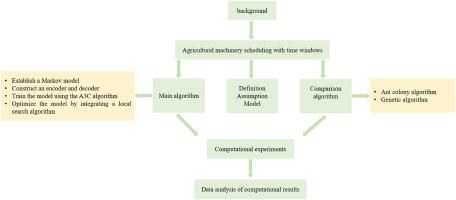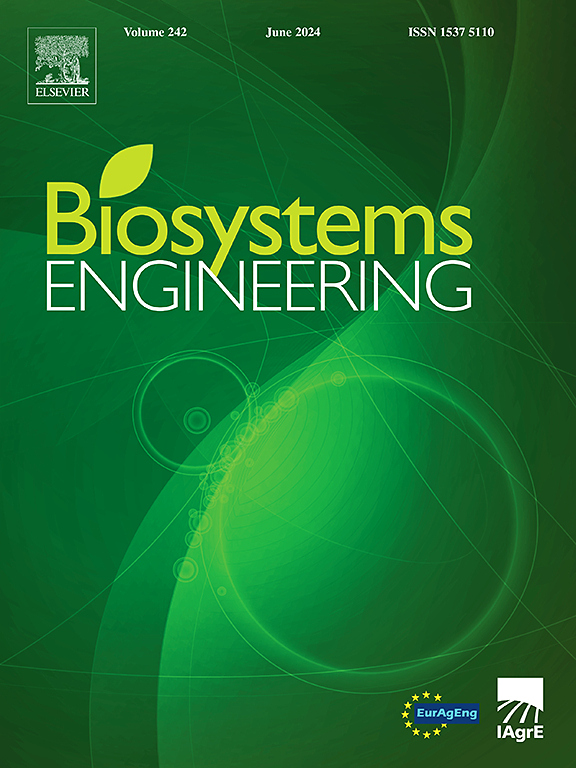基于深度强化学习的时间窗约束下农机调度
IF 5.3
1区 农林科学
Q1 AGRICULTURAL ENGINEERING
引用次数: 0
摘要
本文提出了一种基于深度强化学习(DRL)的方法,解决了传统方法在求解具有时间窗约束的农机调度问题时效率低、精度差、求解质量不稳定等问题。本文首先将农机调度问题分析为马尔可夫决策过程(MDP),利用Transformer架构构建了一个基于注意力的网络,并使用actor-critic算法对模型进行训练。然后结合局部搜索算法进一步优化调度方案。本研究使用20、50和100点比例尺的现场数据集,比较了DRL、蚁群优化(ACO)和遗传算法(GA)等不同调度策略的性能。实验结果表明,在20点尺度下,与蚁群算法和遗传算法相比,DRL算法的调度成本平均降低5.96%和6.57%,运行时间分别减少85.1%和90.8%。在50分尺度下,与ACO和GA相比,DRL平均减少了9.91%和16.7%的调度成本,同时减少了96.0%和98.1%的运行时间。在100点尺度上,与ACO和GA相比,DRL平均减少了13.8%和21.9%的调度成本,同时减少了98.5%和99.1%的运行时间。总体而言,相对于蚁群算法和遗传算法,DRL算法始终能最大限度地降低调度成本,大幅缩短运行时间,为农机调度提供了高效、科学的解决方案。本文章由计算机程序翻译,如有差异,请以英文原文为准。

Agricultural machinery scheduling under time window constraints using deep reinforcement learning
This study proposes a deep reinforcement learning (DRL)-based approach to address key limitations of traditional methods, such as low efficiency, poor accuracy, and unstable solution quality, in solving agricultural machinery scheduling with time window constraints. This study first analyses the agricultural machinery scheduling problem as a Markov decision process (MDP), constructs an attention-based network utilising the Transformer architecture, and trains the model with the actor-critic algorithm. A local search algorithm is then integrated to further refine the scheduling solution. This study uses real-world datasets of field with point scales of 20, 50, and 100 to compare the performance of different scheduling strategies, including DRL, ant colony optimisation (ACO) and genetic algorithm (GA). Experimental results show that, at a 20-point scale, DRL reduces scheduling costs by an average of 5.96 % and 6.57 % compared to ACO and GA, while decreasing runtime by 85.1 % and 90.8 %, respectively. At a 50-point scale, DRL reduces scheduling costs by an average of 9.91 % and 16.7 % compared to ACO and GA, while decreasing runtime by 96.0 % and 98.1 %. At the 100-point scale, DRL reduces scheduling costs by an average of 13.8 % and 21.9 % compared to ACO and GA, while decreasing runtime by 98.5 % and 99.1 %. Overall, the DRL algorithm consistently minimises scheduling costs and substantially decreases runtime relative to ACO and GA, providing an efficient and scientifically grounded solution for agricultural machinery scheduling.
求助全文
通过发布文献求助,成功后即可免费获取论文全文。
去求助
来源期刊

Biosystems Engineering
农林科学-农业工程
CiteScore
10.60
自引率
7.80%
发文量
239
审稿时长
53 days
期刊介绍:
Biosystems Engineering publishes research in engineering and the physical sciences that represent advances in understanding or modelling of the performance of biological systems for sustainable developments in land use and the environment, agriculture and amenity, bioproduction processes and the food chain. The subject matter of the journal reflects the wide range and interdisciplinary nature of research in engineering for biological systems.
 求助内容:
求助内容: 应助结果提醒方式:
应助结果提醒方式:


